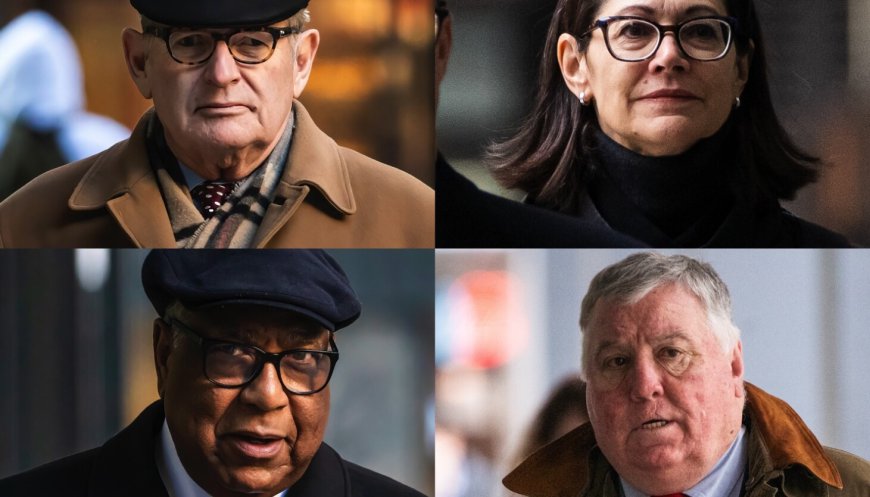Judge tosses 4 of 9 counts in ComEd bribery case in wake of Supreme Court ruling

Four ex-ComEd officials and lobbyists remain convicted of a criminal conspiracy involving former Illinois House Speaker Michael J. Madigan, despite a judge’s decision Monday to toss four of the nine counts in the case in the wake of a 2024 U.S. Supreme Court decision.
U.S. District Judge Manish Shah left intact the conspiracy conviction and other counts against Madigan associate Michael McClain, former ComEd CEO Anne Pramaggiore, ex-ComEd lobbyist John Hooker and onetime City Club President Jay Doherty.
What happens next is unclear. When pressed by the judge after Monday's ruling, Assistant U.S. Attorney Amarjeet Bhachu noted that sentencing guidelines for the four defendants still call for life in prison. He said a new trial on the four vacated counts might be "somewhat fruitless."
Still, Bhachu said he wanted to discuss the ruling with leadership in the U.S. Attorney's office. Shah told prosecutors to file a status report by March 11.
Meanwhile, four remaining counts are tied to the Foreign Corrupt Practices Act. Defense attorneys in the ComEd case have cited an executive order from President Donald Trump calling for a pause and review of enforcement of that law.
Shah declined Monday to put the ComEd case on hold while the consequences of Trump’s order are sorted out. However, Bhachu made clear to the judge "our office will comply with whatever instructions we receive" from the Justice Department when it comes to the FCPA.
The judge vacated three counts that apply only to McClain and Pramaggiore. He tossed one count that applies to all four defendants. The result is that all four defendants remain convicted of one count of conspiracy and four counts of falsifying books and records.
The ruling does not apply to Madigan, who was convicted at the end of a separate trial on Feb. 12, in part for his role in the ComEd conspiracy.
The ComEd jury heard from about 50 witnesses over six weeks in 2023. Ultimately, it agreed that the four defendants arranged for jobs, contracts and money for Madigan allies in an illegal bid to influence him as ComEd’s legislation moved through Springfield. The bills ultimately took ComEd from a “dire” financial situation in the 2000s to record earnings in 2022.
The four ComEd defendants very nearly faced sentencing more than a year ago. But weeks before they were expected to learn their fate, the U.S. Supreme Court picked up a corruption case involving James Snyder, a former mayor of Portage, Indiana. His case raised questions about a federal bribery law that played a role in the ComEd and Madigan cases.
The Supreme Court eventually found that the bribery law does not also criminalize after-the-fact rewards known as “gratuities.” That ruling prompted bold predictions from defense attorneys that the verdict in the 2023 ComEd trial would eventually be tossed.
In handing down his own ruling Monday, Shah pointed to a follow-up order in November by the 7th U.S. Circuit Court of Appeals. It said the Supreme Court’s Snyder opinion “is best understood as having found the jury instructions were erroneous.”
The instructions in the ComEd case were similar, Shah noted Monday.
The Supreme Court’s Snyder ruling has complicated things for prosecutors, but it’s yet to significantly disrupt their aggressive campaign against corruption in Chicago and Illinois.
U.S. District Judge John Blakey postponed Madigan’s trial for six months to let things play out at the Supreme Court. After its ruling came down, Blakey chose not to disturb the indictment that had been handed up against the once-powerful Southwest Side Democrat.
Blakey also had the benefit of reading the high court’s decision before instructing the jury in Madigan’s case. That jury then found Madigan guilty of three counts tied to the bribery law.
Madigan will likely challenge those convictions on appeal, though.
Meanwhile, the four ComEd defendants could still wind up facing significant prison time — just as they did in December 2023, before the Supreme Court decided to examine the bribery law.
That’s not to say everything has gone the feds’ way since the ruling. In an unrelated case in August, a jury acquitted an Indiana businessman accused of bribing employees of the Cook County assessor’s office.
Prosecutors have also failed twice to secure a conviction over Madigan-related bribery allegations involving AT&T Illinois. Jurors couldn’t reach a verdict in September when the utility’s former president, Paul La Schiazza, went to trial. The jury in Madigan’s case also failed to reach an agreement over those claims.
Nevertheless, La Schiazza is due to face trial all over again in June.
Contributing: Rafaela Jinich
What's Your Reaction?
 Like
0
Like
0
 Dislike
0
Dislike
0
 Love
0
Love
0
 Funny
0
Funny
0
 Angry
0
Angry
0
 Sad
0
Sad
0
 Wow
0
Wow
0



































